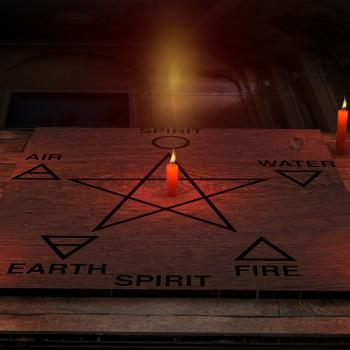“In the very center of your being, there is a tiny beating heart.”
-Martin Chatwin, The Magicians season 2 episode 1.
Most people who are magically inclined are familiar with the shadow self and/or shadow work. For those who aren’t, the shadow self is a collection of personal aspects you don’t particularly like to look at. The parts of yourself that make you feel guilty, or ashamed, or hurt, or embarrassed. The process of looking at and learning about your shadow aspects is referred to as shadow work, and can range from cognitive/dialectical behavioral therapy to ecstatic trance journeying through the shadow.

The shade, as introduced by the initial quote, is the part of yourself that is sensitive and feels everything more intensely, for better or worse. Many bury and hide this raw, emotional self, pushing it into the world of shadow. Obviously, this leads to substantial overlap, but it’s important to see the subtle distinctions of the two.
I believe the parts of the Self that people learn to hide and suppress, the parts that are the softest, are often determined by the environment during childhood. Childhood trauma, even things we consider minor such as ostracization, nitpicking and perfectionism from parents, and persistent media input (like constant images of super skinny female and super buff male models) can cause a huge shift in a child’s (or any person’s, though children are malleable by design) sense of self.
“All parents damage their children. It cannot be helped. Youth, like pristine glass, absorbs the prints of its handlers. Some parents smudge, others crack, a few shatter childhoods completely into jagged little pieces, beyond repair.”
― Mitch Albom, The Five People You Meet in Heaven
The world is having something of a shade crisis- a great many people are burying their emotions, hiding their soft underbellies, and eliminating all signs of weakness, on a grand scale. As a result they are wildly out of touch with their emotions, unable to understand their own subconscious microcosm. We need more people who are willing to show their softness and face their own vulnerabilities.
The primary method of shadow work from a magical point of view is trance journeying- mentally traveling down to the Underworld, usually visualizing a staircase or alternate method of descent. Here you can make direct contact with your Shadow Self- be warned, this is not always pleasant. Remember you’ve essentially locked your Shadow in the basement for years.
Another tried and true method? Cognitive and Dialectical Behavior Therapy. Whether that means seeing a licensed therapist (highly recommended) or just self-analyzing your deeper motivations when you make decisions or lash out emotionally. I am a firm believer than everyone who can see a therapist or counselor, should, but understand that isn’t a viable option for everyone.

Something I learned in therapy years ago is to literally meet your emotions. Try to focus on one of them, how it makes you feel, where you feel it, what triggers it. Open yourself to the experience of that one emotion. Ask what it’s trying to tell you. Listen to and honor what you feel. We emote for a reason- your heart is trying to tell you something you need to know.
What the shade needs, more than anything else, is to be heard. This is the side of yourself that’s been kept hidden. It needs to be brought into the light, in whichever way works best for you.
I, personally, have more luck with the more psychological and subtle forms of shadow work: checking in with my physical, emotional, and spiritual bodies to see how I am really feeling, on all levels. Journaling in order to track patterns in my mood. Listening to my intuition. Making the active choice to be vulnerable. Embracing activities I enjoy that bring up feelings of social shame. Comforting and empowering my inner child.
What you’ll consistently hear is that this work hurts, but is ultimately worth it; you understand yourself better, you realize how much more control you have over your life than you thought, and make peace with buried emotions that would otherwise subconsciously sabotage your happiness. Ignoring these more subconscious parts of yourself generally does more harm than good. Because this work is so centered on consciously rebuilding the foundations of how you interact with the world, it is especially important that you take care of yourselves. Create the you you want to be, and love yourself like you already are.


















